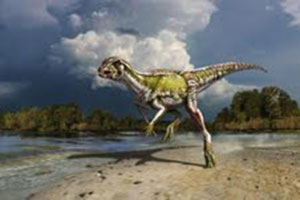Dinosaurs are often thought of as large, fierce animals, but new research highlights a previously overlooked diversity of small dinosaurs. A team of paleontologists from the University of Toronto, Royal Ontario Museum, Cleveland Museum of Natural History and University of Calgary have described a new dinosaur, the smallest plant-eating dinosaur species known from Canada. Albertadromeus syntarsus was identified from a partial hind leg, and other skeletal elements, that indicate it was a speedy runner. Approximately 1.6 m (5 ft) long, it weighed about 16 kg (30 lbs), comparable to a large turkey.
Albertadromeus lived in what is now southern Alberta in the Late Cretaceous, about 77 million years ago. Albertadromeus syntarsus means “Alberta runner with fused foot bones.” Unlike its much larger ornithopod cousins, the duckbilled dinosaurs, its two fused lower leg bones would have made it a fast, agile two-legged runner. This animal is the smallest known plant-eating dinosaur in its ecosystem, and researchers hypothesize that it used its speed to avoid predation by the many species of meat-eating dinosaurs that lived at the same time.
Why are so few small-bodied dinosaurs known from North America some 77 million years ago? Smaller animals are less likely to be preserved than larger ones, because their bones are more delicate and are often destroyed before being fossilized. “We know from our previous research that there are preservational biases against the bones of these small dinosaurs,” said Caleb Brown of the University of Toronto, lead author of the study. “We are now starting to uncover this hidden diversity, and although skeletons of these small ornithopods are both rare and fragmentary, our study shows that these dinosaurs were more abundant in their ecosystems than previously thought”.
The reason for our relatively poor understanding of these small dinosaurs is a combination of the taphonomic processes described above, and biases in the way that material has been collected. Small skeletons are more prone to destruction by carnivores, scavengers and weathering processes, so fewer small animals are available to become fossils and smaller animals are often more difficult to find and identify than those of larger animals.
“Albertadromeus may have been close to the bottom of the dinosaur food chain but without dinosaurs like it you’d not have giants like T. rex,” said Michael Ryan. “Our understanding of the structure of dinosaur ecosystems is dependent on the fossils that have been preserved. Fragmentary, but important, specimens like that of Albertadromeus suggest that we are only beginning to understand the shape of dinosaur diversity and the structure of their communities”.
Source: Science Daily
N.H.Khider

